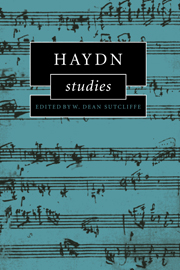Book contents
- Frontmatter
- Contents
- Preface
- Editor's note
- 1 The consequences of presumed innocence: the nineteenth-century reception of Joseph Haydn
- 2 Haydn's sacred vocal music and the aesthetics of salvation
- 3 Sentiment and sensibility in La vera costanza
- 4 Haydn as Romantic: a chemical experiment with instrumental music
- 5 Haydn's ‘Cours complet de la composition’ and the Sturm und Drang
- 6 Haydn's reversals: style change, gesture and the implication-realization model
- 7 Haydn's symphonies between Sturm und Drang and ‘Classical style’: art and entertainment
- 8 The Haydn piano trio: textual facts and textural principles
- 9 Papa Doc's recap caper: Haydn and temporal dyslexia
- 10 Haydn: the musicians' musician
- Index
1 - The consequences of presumed innocence: the nineteenth-century reception of Joseph Haydn
Published online by Cambridge University Press: 22 September 2009
- Frontmatter
- Contents
- Preface
- Editor's note
- 1 The consequences of presumed innocence: the nineteenth-century reception of Joseph Haydn
- 2 Haydn's sacred vocal music and the aesthetics of salvation
- 3 Sentiment and sensibility in La vera costanza
- 4 Haydn as Romantic: a chemical experiment with instrumental music
- 5 Haydn's ‘Cours complet de la composition’ and the Sturm und Drang
- 6 Haydn's reversals: style change, gesture and the implication-realization model
- 7 Haydn's symphonies between Sturm und Drang and ‘Classical style’: art and entertainment
- 8 The Haydn piano trio: textual facts and textural principles
- 9 Papa Doc's recap caper: Haydn and temporal dyslexia
- 10 Haydn: the musicians' musician
- Index
Summary
The Haydn paradox: from engaged affection to distant respect
The mystery that plagues the contemporary conception and reception of Haydn and his music has a long and remarkably unbroken history. Perhaps Haydn experienced the misfortune (an ironic one when one considers the frequency of premature deaths among his great contemporaries or near contemporaries) of living too long. Years before his death in 1809 he was considered so old that the French and English had already presumed him dead in 1805. Many wrote condolence letters and a Requiem Mass was planned in Paris. Haydn's music was both familiar and venerated. Raphael Georg Kiesewetter (1773–1850), writing in Vienna in 1846, reflected the perspective of the beginning of the nineteenth century in his Geschichte der europaeisch-abendlaendischen oder unsrer heutigen Musik. Haydn had ‘elevated all of instrumental music to a never before anticipated level of perfection’. Haydn had a ‘perfect knowledge of instrumental effects’ and with Mozart (for whom Haydn was the ‘example and ideal’) created a ‘new school which may be called the German or … the “Viennese” school’. Theirs was the ‘golden age’ of music. Most significantly, Haydn's instrumental works represented the standard of what was ‘true beauty’ in music.
- Type
- Chapter
- Information
- Haydn Studies , pp. 1 - 34Publisher: Cambridge University PressPrint publication year: 1998
- 27
- Cited by



